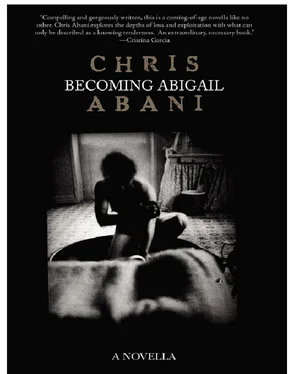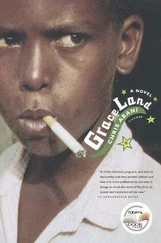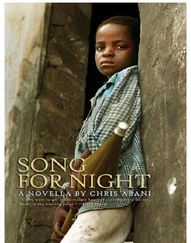But then neither had she really seen them. She tried to. Staring. Watching from the corner of her eye. Trying to piece them together. But they gave nothing, these men. They were experts at hiding themselves, the details of their lives. Even when they walked hand in hand with her in public, it was never the luxuriating of one person in the presence of an equal. No. They led her, pulled her behind their chest-thrust-forward-see-how-lucky-I-am-to-get-such-a-pretty-young-thing walk. They never undressed with her, or for her. There was always a furtive shame to their nudity, and a need to be done quickly, to hide it, theirs and hers, behind clothes again. And this thing that was shameful about them, they put on her, into her, made hers. They left her holding it, like the squish of a tree slug in the mouth, slimy and warm. Something you wanted to spit out and yet swallow at the same time. And though there had only been a few men, sometimes she felt like there had been whole hordes.
She had been ten when her first, fifteen-year-old cousin Edwin, swapped her cherry for a bag of sweets. The caramel and treacle was the full measure of his guilt. Then while stroking her hair tenderly, he whispered softly.
“I will kill you if you tell anyone.”
And even light can become dirty, falling sluggish and parchment-yellow across a floor pitted by hope walked back and forth, the slap of slipper on concrete echoing the heat gritting its teeth on the tin roof, the sound sometimes like rain, other times like the cat-stretch of metal expanding and contracting.
And there was also the business of reading maps. Her favorite thing. The only things she read. Other than old Chinese poetry in translation. Fragments, memorized, came to her. Mostly from Emperor Wu of Han. Dripping melancholy and loss; she couldn’t get enough. The poem: Autumn Wind. I am happy for amoment/ And then the old sorrow comes back/ I was young onlya little while/ And now I am growing old/.
She was lying face down over a large map spread out on the living room floor, studying it intently. She ran her fingers meditatively over the spine of the Himalayas, while peering at the upside-down fish that was New Zealand. There was something in the way the Amazon basin curled up, all green and fresh like a new fern unfurling, that reminded her of a story she had read somewhere about a Chinese poet from a long time ago who tried to live his entire life as a poem.
He was famous for the beautiful landscapes he created in low wide-lipped #1#2 pots — white sand flowing like a bleached sea floating over the loam holding it up, sweeping up to the miniature trees that would inspire the later Japanese bonsai, rocks lounging in the shade, and little pools with the littlest fish. At least that’s what she imagined. There were no pictures to go by, nothing but what her mind could conceive. But it was the story of how he made his tea that stayed with her. Came flooding back as her hands roamed over the smooth green of the map. She mentally went through the process, making a love of it, measured in objects.
An intricate box made from rice paper that allowed just the right amount of air through, held up by a copper handle; and inside, a shallow pot with a lotus in the center. Then at dusk, the freshest tips of green tea picked and wrapped in the petals of the rare blue lotus from Egypt. The box, hung from the rafters of his veranda, took in all that was night. Dawn: the box taken down; the wait for the lotus petals to unravel slowly with the sun; and a pot of hot water, brought to boil; the leaves, dropped in the pot of water; inhaled, the gentle aroma of green tea, suffused with the longing of lotus.
She liked that. Was like that. Wrapping herself each night in anecdotes about Abigail. Collected until she was suffused with all parts of her. She rolled the map up and snapped an elastic band securely around it. Leaving it in a corner, she crossed a shaft of light from the shutters and cut a swathe through the motes, leaving the room to the silence and the dirty, lazy sunlight.
The cigarette burnt her finger as it smoked down to the filter. She threw it into the river. Following its glowing path, she imagined the hiss of its extinction as it hit the thick wet blackness. Sucking her finger she watched a train rumble across a bridge flickering light from its coaches into the water, back and forth over the Thames, carriages lighting the darkness of warehouses and tired stations. It was like the reassurance of blood. That life would go forwards and backwards, but never stop. Not unless the tracks were snowed over.
She pulled up her left sleeve and absently traced the healed welts of her burning. They had the nature of lines in a tree trunk: varied, different, telling. Her early attempts were thick but flat noodles burned into her skin by cashew sap. With time came finer lines, from needles, marking an improvement. But there were also the ugly whip marks of cigarette tips. Angry. Impatient. And the words: Not Abigail. My Abigail. Her Abigail? Ghosts. Death.Me. Me. Me. Not. Nobody. She stared at them.
This burning wasn’t immolation. Not combustion. But an exorcism. Cauterization. Permanence even. Before she began burning herself she collected anecdotes about her mother and wrote them down in red ink on bits of paper which she stuck on her skin, wearing them under her clothes; all day. Chaffing. Becoming. Becoming and chaffing, as though the friction from the paper would abrade any difference, smooth over any signs of the joining, until she became her mother and her mother her. But at night, in the shower, the paper would dissolve like a slow lie, the red ink, warm from the hot water, leaking into the drain like bloody tears. That was when she discovered the permanence of fire.
Fumbling about in her bag, she pulled out her purse. Opening it, she stroked the two photographs in the clear plastic pouch, the faces of the two men she loved. Her father, obsidian almost, scowling at the world. Derek, white, smiling as the sun wrinkled the corners of his eyes.
“I am sorry.”
She muttered the mantra repeatedly. Soothing.
It was getting chilly and she wished she was wearing more than a light denim shirt. No point in catching a cold as well, she thought, sniffling unconsciously.
She stared at the thin undecided film of foam coating the surface of the beer glass on the table. It reminded her of the lake she used to swim in as a child. Not so much a lake, more of a swimming hole; a deep circular cup of rock that sat in the middle of the savanna as though a giant had put down his mug too hard, embedding it in the loose loam. Trees formed a protective circle and birds screamed rudely from the thick foliage.
The beer in the glass sloshed from side to side as she picked it up to clear the dishes from a late reheated dinner served to her father when he got back from the pub, hungry and tired. He had been impatient, making her give him the food near cold. Catching the light, the beer reflected it. The way the swimming hole would: in a bright smile. It reminded her of happier times. That is, until the grief over her mother’s death.
It was strange enough just to think about this as grieving. Her mother had died in childbirth — her birth. But this tradition recognized complex ways to be human, and she was allowed to mourn. It was considered harmless. Healing even. The only one who seemed bothered just a little by it was her father. He however deferred to the wisdom of the group and observed silently. Abigail often caught him looking at her and she wondered how it was for him. To watch his child, who looked so much like his dead wife, grieve. As though she was a young version of his wife, grieving her own death in advance.
Читать дальше












